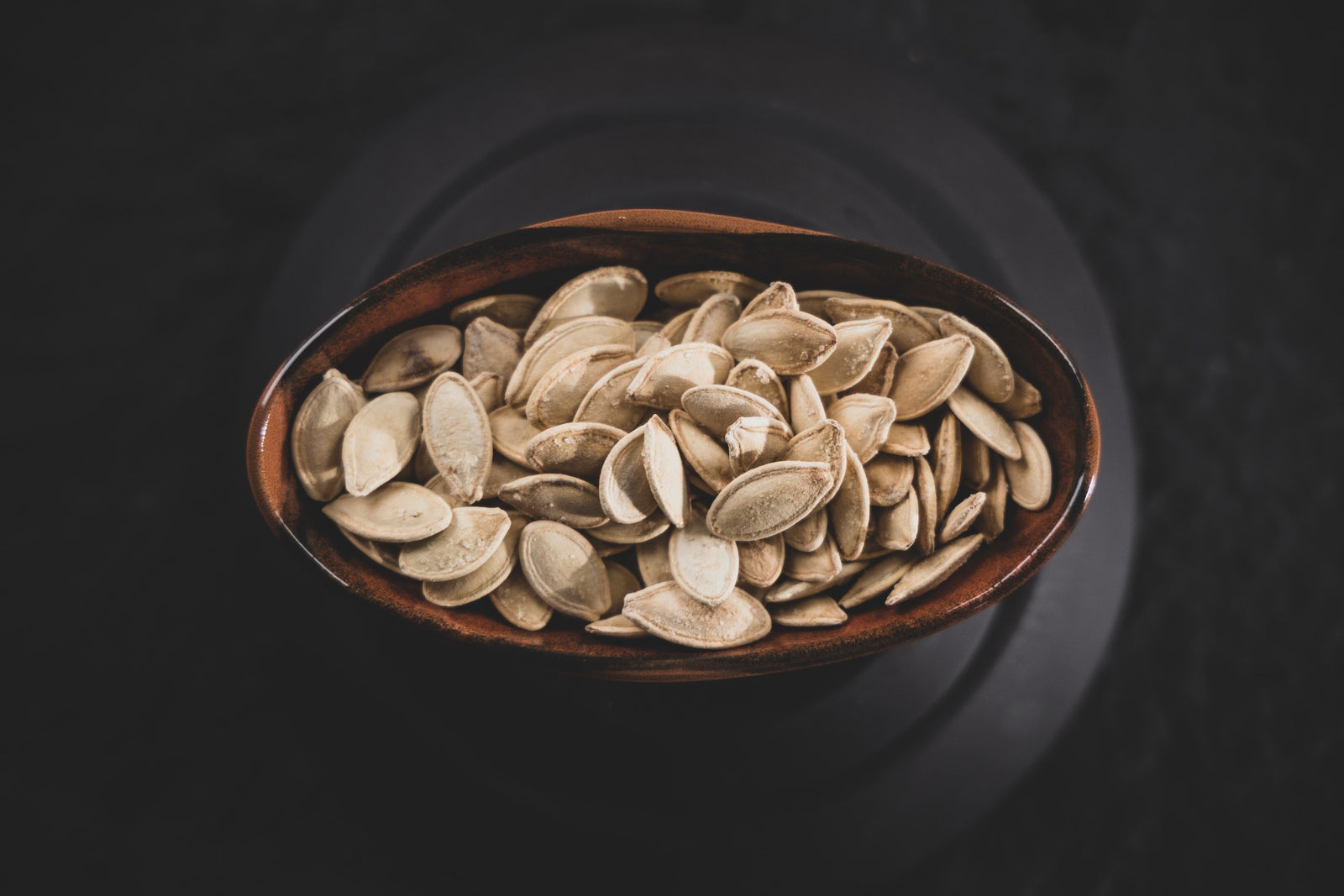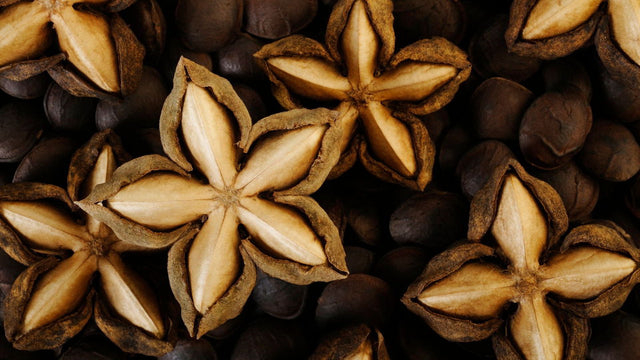Plant protein has been gaining massive traction amongst health-conscious consumers due to the copious amounts of health benefits. Studies have shown that those who include more plant-based foods in their diet, with fewer refined and processed foods have a lower rate of morbidity due to chronic disease states. When it comes to plant-based vegan protein powders, pumpkin seeds are one of the best ingredients you can get. Pumpkin seeds are packed with healthy Omega-3 fats, antioxidants, essential micronutrients, and minerals such as zinc, iron, and magnesium. We are going to cover 5 pumpkin seed protein benefits so you can decide if you should add it to your daily protein consumption.
What Is Pumpkin Seed Protein
Pumpkin seed protein is a high-quality plant-based, vegan protein powder derived from pumpkin seeds. Pumpkin seed protein is a by-product of the pumpkin oil manufacturing process and is obtained during a cold-processed extraction process of the pumpkin seed oil, collected from the “press cake.” The cake is then collected and milled then ground into pumpkin protein powder.
Pumpkin Seed Protein Nutrition
Just one ounce of pumpkin seeds provides 150 calories, 15g of healthy fats, 2-3g of carbs, and 9-10g of protein, making up nearly 35% of the total nutritional content.
Pumpkin seeds, like Sacha Inchi protein, are one of the best sources of plant-based omega-3 fatty acids, called alpha-linolenic acid or ALA. Studies have shown that ALA has promising anti-inflammatory properties, which contain numerous health benefits for your heart, joints, and brain function. Pumpkin seeds are a great source of Vitamin E, which is rich in antioxidants. Antioxidants help reduce oxidative stress and free-radical damage, improving overall health and wellness.
Pumpkin Seed Protein Benefits
First and foremost, protein has many known benefits from regulating hormones, to supporting athletic goals, such as building more lean muscle mass and promoting better exercise recovery. Protein is comprised of amino acids, which are required to facilitate muscle protein synthesis, or the muscle-building process. Pumpkin seed protein, however, is not considered to be a complete protein, since it’s low in the essential amino acids threonine and lysine.
In our vegan plant-based protein powder, Swolverine combines pumpkin seed protein, with quinoa, pea protein isolate, hemp protein, and Sacha Inchi protein, in a proprietary blend-free mix, to ensure you’re getting an adequate amount of all the essential and nonessential amino acids you need to improve your performance goals.
RECOMMENDED PRODUCT Plant Protein (25 Servings, Chocolate Cake)
1. Balances Blood Sugar
Diabetes is a serious global metabolic disorder characterized by elevated blood glucose levels resulting from the failure of cells to use glucose adequately. Diabetes occurs due to the inability of the pancreas to produce sufficient amounts of insulin, the resistance of cellular tissues to insulin activity, or both. Diabetes is the cause of over 1 million deaths annually. Pumpkin seeds have been shown to promote hypoglycemic activity and could potentially modulate diabetes by stimulating insulin release.
2. Contains Powerful Antioxidants
Pumpkin seeds are a great source of Vitamin E. Vitamin E is comprised of phenolic compounds also known as antioxidants. Pumpkin seeds contain the powerful antioxidants tocopherols and tocotrienols which have the ability to deactivate highly active free radicals and oxidative stress. Oxidative stress has been linked to the aging process, as well as chronic disease states. The more antioxidants you can obtain from your diet, the better, which help reduce signs of aging and maintain optimal health.
3. May Improve Sleep
If you think casein helps your sleep, just wait until experience this benefit of pumpkin seed protein. Pumpkin seeds contain a wholesome amount of the amino acid l-tryptophan at 300mg per four-ounce serving. The body utilizes tryptophan to produce serotonin and melatonin, hormones that are essential for sleep. Pumpkin seeds also contain zinc which can assist the brain in converting tryptophan into serotonin as well as magnesium.
4. Boosts Immune Health
Pumpkin seeds contain anti-microbial and anti-bacterial properties. Studies show that pumpkin seed protein also contains anti-fungal properties, inhibiting pathogens and bacteria from proliferating. In addition to these properties, pumpkin seeds are rich in antioxidants, as well as powerful minerals such as zinc and iron both of which are vital for immune system function.
Pumpkin seeds also exhibit Anthelmintic effects on the gastrointestinal system, essentially helping destroy parasites and pathogens.
5. May Improve Heart Health
Pumpkin seeds are a good source of healthy omega-3 fatty acids alpha-linoleic acid, antioxidants, magnesium, and zinc, which have all been correlated to better good heart health. Pumpkin seeds may reduce blood pressure and potential risk factors associated with heart disease. Animal studies show that a benefit of eating pumpkin seed protein is associated with a 22% decrease in “bad” LDL cholesterol and up to a 48% increase in antioxidant activity, compared to casein protein [R].
Pumpkin Seed Protein Benefits: Takeaway
When you're looking for a good plant-based, vegan protein powder, make sure it contains pumpkin seed protein. Pumpkin seeds are nutritionally rich in antioxidants, healthy omega-3 fatty acids, as well as essential vitamins and minerals. Highly concentrated in protein, pumpkin seeds make for one of the best ingredients in your plant-based vegan protein.
Looking for the best plant-based protein to build more muscle, shred body fat, and improve athletic performance?
References
Joachim M. Dotto, James S. Chacha, The potential of pumpkin seeds as a functional food ingredient: A review, Scientific African, Volume 10,
2020, e00575, ISSN 2468-2276, https://doi.org/10.1016/j.sciaf.2020.e00575.
(https://www.sciencedirect.com/science/article/pii/S2468227620303136)
Abuelgassim, Abuelgassim O, and Showayman I A Al-showayman. “The effect of pumpkin (Cucurbita pepo L) seeds and L-arginine supplementation on serum lipid concentrations in atherogenic rats.” African journal of traditional, complementary, and alternative medicines : AJTCAM vol. 9,1 131-7. 2 Oct. 2011, doi:10.4314/ajtcam.v9i1.18














